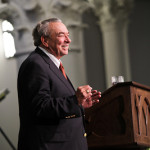 This excerpt is taken from Dr. R. C. Sproul’s book, He will direct our paths (Prov. 3:5–6). We are encouraged by Scripture to learn the will of God for our lives, and we do so by focusing our attention not on the decretive will of God but on the preceptive will of God. If you want to know God’s will for your life, the Bible tells you: “This is the will of God, your sanctification” (1 Thess. 4:3). So when people wonder whether to take a job in Cleveland or in San Francisco, or whether to marry Jane or Martha, they should study closely the preceptive will of God. They should study the law of God to learn the principles by which they are to live their lives from day to day.
This excerpt is taken from Dr. R. C. Sproul’s book, He will direct our paths (Prov. 3:5–6). We are encouraged by Scripture to learn the will of God for our lives, and we do so by focusing our attention not on the decretive will of God but on the preceptive will of God. If you want to know God’s will for your life, the Bible tells you: “This is the will of God, your sanctification” (1 Thess. 4:3). So when people wonder whether to take a job in Cleveland or in San Francisco, or whether to marry Jane or Martha, they should study closely the preceptive will of God. They should study the law of God to learn the principles by which they are to live their lives from day to day.
The psalmist writes, “Blessed is the man who walks not in the counsel of the wicked, nor stands in the way of sinners, nor sits in the seat of scoffers; but his delight is in the law of the Lord, and on his law he meditates day and night” (Ps. 1:1–2). The godly man’s delight is in the preceptive will of God, and one so focused will be like “a tree planted by streams of water that yields its fruit in its season” (v. 3). The ungodly, however, are not like that but “are like chaff that the wind drives away” (v. 4).
If you want to know which job to take, you have to master the principles. As you do, you will discover that it is God’s will that you make a sober analysis of your gifts and talents. Then you are to consider whether a particular job is in keeping with your gifts; if it is not, you should not accept it. In that case, the will of God is that you look for a different job. The will of God is also that you match your vocation—your calling—with a job opportunity, and that requires a lot more work than using a Ouija board. It means applying the law of God to all the various things in life. Continue reading

